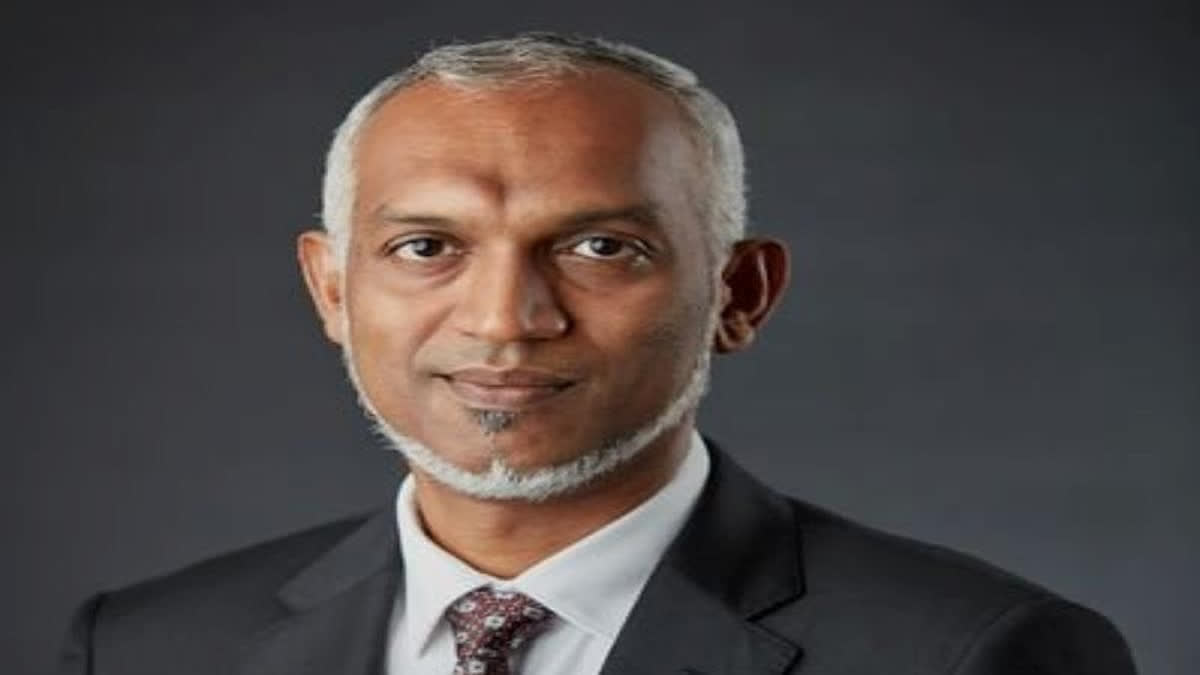New Delhi:When pro-China candidate Mohamed Muizzi won the Maldives presidential election, there were apprehensions that ties between India and the Indian Ocean archipelago might go south, especially in terms of defence cooperation. After all, Muizzu had won the election following a very pronounced anti-India campaign.
Muizzu had carried out his presidential election campaign on the plank of an ‘India out’- later ‘Indian military out’ – campaign and defeated incumbent president Ibrahim Solih, who is known for his ‘India first’ policy. Muizzu and his teams had claimed that the number of Indian military personnel in the Maldives exceeded 1,000 and they posed a threat to national security. Muizzu had said that the removal of the Indian troops would be his topmost priority as President.
That he was anti-India became evident when Muizzu, after assuming office, decided to not make India the destination for his first state visit, as was the practice followed by his three immediate predecessors, and instead chose Turkey. He, however, met Prime Minister Narendra Modi on the sidelines of the COP28 Summit in Dubai and requested for the removal of the Indian troops from the Maldives.
Muizzu's pro-China motives became evident when, earlier this month, the Maldives decided to skip the Colombo Security Conclave (CSC) hosted by Mauritius and instead participated in the China-Indian Ocean Region Forum meeting held in Kunming, China. Both the events were held almost simultaneously. The CSC is a maritime security grouping comprising India, Sri Lanka, the Maldives and Mauritius with Bangladesh and the Seychelles as observer nations.
What will be a matter of concern for New Delhi is that the China-Indian Ocean Region Forum, which the Maldives opted for, poses a challenge to the Indian Ocean Region Association (IORA), an international organisation consisting of 23 countries, including India, bordering the Indian Ocean. The IORA has identified six priority areas, namely, maritime security, trade and investment facilitation, fisheries management, disaster risk reduction, academic and scientific cooperation and tourism promotion and cultural exchanges.
Thereafter, the Maldives opted not to renew a hydrography agreement with India citing national security concerns and the safeguarding of sensitive information. The hydrographic survey agreement was signed on June 8, 2019, during Modi’s visit to the Maldives. Under the agreement, India was allowed to conduct a comprehensive study of the island nation’s territorial waters, which includes reefs, lagoons, coastlines, ocean currents, and tide levels.
As part of New Delhi’s Neighbourhood First Policy, the Maldives is strategically significant to India because of its location in the Indian Ocean. India and the Maldives share ethnic, linguistic, cultural, religious and commercial links steeped in antiquity and enjoy close, cordial and multi-dimensional relations. However, regime instability in the Maldives since 2008 has posed significant challenges to the India-Maldives relationship, particularly in the political and strategic spheres.
Although India continues to be an important partner of the Maldives, New Delhi cannot afford to be complacent over its position and must remain attentive to the developments in the Maldives. India must play a key role within the Indo-Pacific security space to ensure regional security in South Asia and surrounding maritime boundaries. China’s strategic footprint in India’s neighbourhood has increased. The Maldives has emerged as an important ‘pearl’ in China’s ‘String of Pearls’ construct in South Asia.
However, two developments earlier this week indicate that India-Maldives defence ties might not have gone south yet. One is that Muizzu’s claim during his presidential campaign about over 1,000 Indian military personnel being present in the Maldives and posing a threat to national security may well turn out to be hollow.
This was evident from the remarks made by Mohamed Shahyb, the chief spokesperson of the President’s Office, during a press conference earlier this week. According to a report in the Maldivian news website raajje.mv, Shahyb had said that the exact number of Indian military personnel present in the Maldives will be clarified during the course of the press conference.
“At the press conference which went on for more than an hour, a journalist questioned Shahyb on why they had not received details, even after an hour had passed,” the report stated. “Shahyb responded that they were aware that the number is currently at 89. However, it was not verified. Shahyb noted that being unable to verify this figure did not pose a threat to national security.”
Muizzu had said that the first priority after he assumed office would be the removal of the Indian troops. However, shortly after he assumed office in November, his administration said that there are 77 military personnel from neighbouring India present in the Maldives. Now, after Shahyb’s remarks, that figure has also come under doubt.
It has been over a month since President assumed office. But till date, his government still does not know the exact number of Indian troops present in the country. But the fact of the matter is that the few Indian troops present in the Maldives are only involved in humanitarian assistance and disaster relief work.
